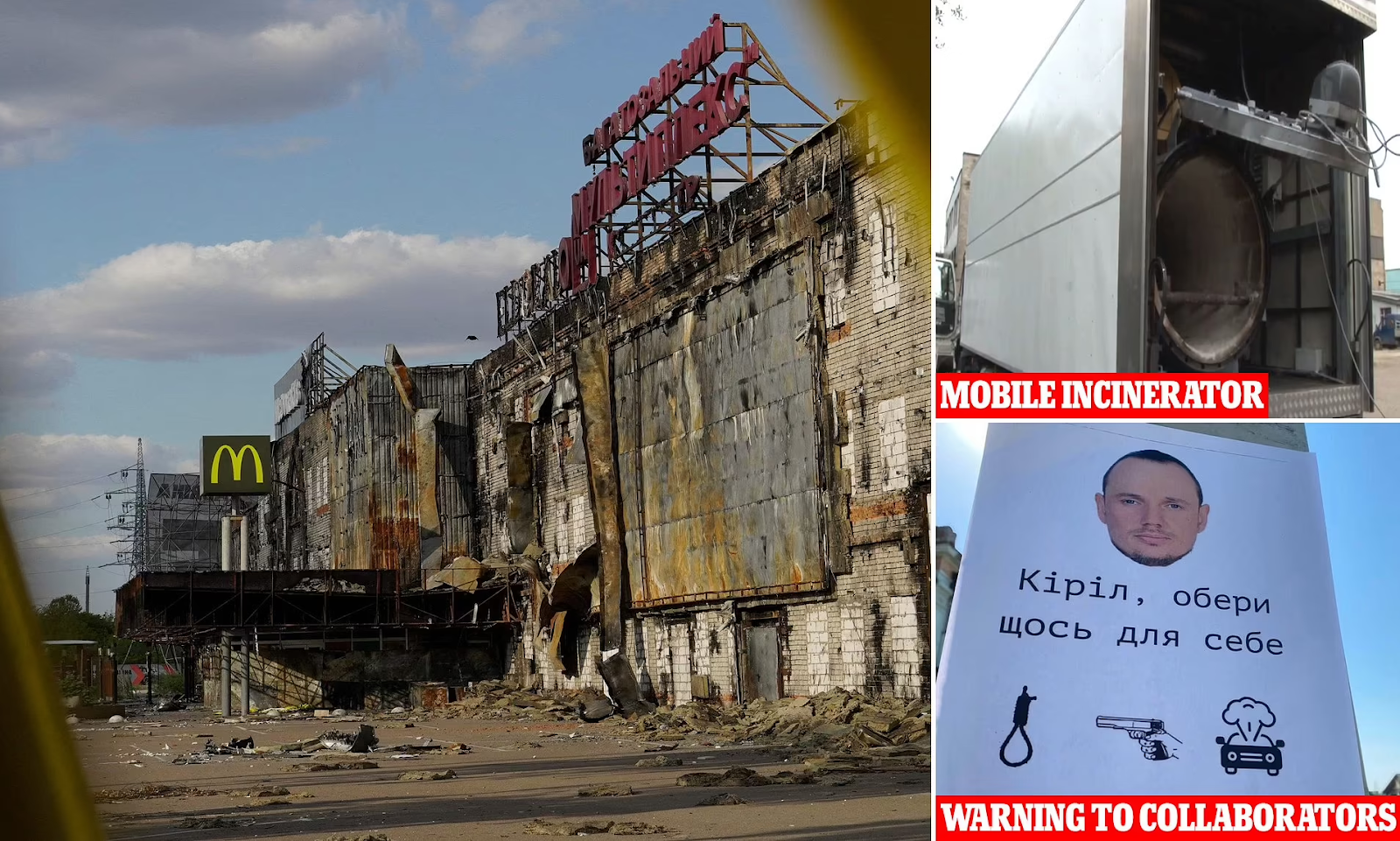A cloud of thick smoke hangs
over the occupied city of Kherson in Ukraine. It’s very stench is evidence
of Russian war crimes, on a scale almost too sickening to contemplate.
The smoke comes from mobile
incinerators that are running night and day. Vladimir Putin’s paranoid
soldiers are burning the corpses of Ukrainian citizens tortured and murdered on
suspicion of helping the resistance.
And they are dispatching the
bodies of their own comrades too — hundreds of them. The Russians are killed by
the constant pounding of Ukrainian shells from artillery placements surrounding
the city and by highly organized, secret units of freedom fighters.
They are even killed by gangs
of youths armed with knives who set upon drunken Russians and stab them.
The incinerators fill Kherson
with the reek of charred flesh. There is no mistaking the smell and it adds to
the pervasive sense of horror in this Black Sea port. It is a living hell.
I am in contact with
pro-democracy activists inside the city who have managed — for the first time
since the start of the occupation — to get information out, describing the
situation as it deteriorates daily, so that the world can finally have some
idea of their plight.
To identify my sources in any
way would be to condemn them to certain death. All I can say is that this
information is reliable and comes from Kherson residents fiercely opposed to
Russian occupation, who are risking everything to reveal the truth.
They say many of the Russian
troops are drunk all of the time.
Arms, ammunition, kit and even
food are in short supply for Putin’s blundering army — but vodka is always
available in abundance.
These soldiers are rounded up
from the poorest regions of Putin’s empire, far away from St Petersburg and
Moscow. No one in the main cities wants to have their sons sent to be butchered
in occupied territory.
Instead, bribes are often
offered in rural districts, where conditions are little different from the
world of Tolstoy’s peasants. Many people are illiterate and generally ignorant
of international news. They live largely without sanitation, in poverty and disease.
These families don’t want to
send their young men to war either. But they cannot afford to refuse the
government payouts.
And consequently, men from
these regions are treated by the Kremlin as utterly disposable, lives without
worth. Yet still, to return them to their villages in bodybags would be
considered a military embarrassment — as well as an unwarranted expense — and
so their remains are simply incinerated. Worthless in life, worthless in death.
When the Russians first
occupied places such as Bucha, outside Kyiv, they were almost apologetic to
Ukrainian citizens. On a ‘special military operation’ they’d been told would be
over soon, these young men didn’t really want to be there. In an odd way, the
invaders were almost pathetically friendly.
But then their comrades
started to die. And the mood changed.
Now in Kherson, Russians are
hunted by snipers, ambushed and bombed. Thanks to consignments of Western arms,
the Armed Forces of Ukraine (AFU) has the power to inflict serious damage.
The weapon the Russians fear
most is the M142 High Mobility Artillery Rocket System (HIMARS), supplied by
the U.S. and capable of firing barrages of missiles from the back of an
armoured lorry. Both maneuverable and lethally accurate, these rocket launchers
are effectively unstoppable. They can wipe out an ammunition dump or a column
of tanks in one hit.
I’m told that many of the
rural Russian soldiers, who have never encountered such advanced military
technology, are petrified: ‘They talk of the HIMARS almost as children do of
dragons.’
The Ukrainians are exploiting
this advantage. The last consignment of American HIMARS missiles was expected
to sustain the AFU for a month. But they blazed off the whole lot in three days
— and with devastating effects.
At the other end of the
fightback are the insurgent youths, ambushing Russians with their daggers.
Ukraine’s government does not want to admit this is happening, perhaps because
it exposes how desperate the defense has become. But the Russians will not
acknowledge it either, because they are ashamed of the damage these youngsters
are inflicting.
Groups with knives, sometimes
a handful and sometimes a marauding gang, attack Russians wherever they can —
slashing them, stabbing them, cutting their throats if they get the chance.
Their fury reflects the hatred
of ordinary Ukrainians for the invaders. Putin’s continued pretense that people
in the coastal cities have welcomed his army as liberators could not be further
from the truth.







